- Home
- Harlan Coben
Gone for Good (2002) Page 10
Gone for Good (2002) Read online
Page 10
"It's not like the rest of us are well planned," I said.
She laughed a little at that, and the sound echoed deep inside me. It was Julie's laugh, even the way it faded away.
"Sorry about my dad," Katy said. "He just freaked when he saw you."
"Ishouldn't have done that."
She took too long a drag and tilted her head. "Why did you?"
I thought about the answer. "I don't know," I said.
"I saw you. From the moment you turned the corner. It was weird, you know. I remember as a little kid watching you walk from your house. My bedroom. I mean, I'm still in the same bedroom, so it's like I was watching the past or something. It felt weird."
I looked to my right. The drive was empty now, but during the school year, that was where the parents sat in cars and waited for their kids.
Maybe my high school memories are not all good, but I remember my mom picking me up there in her old red Volkswagen. She'd be reading a magazine and the bell would ring and I'd walk toward her and when she'd spot me, when she first raised her head and sensed that I was coming near, her smile, that Sunny smile, would burst forth from deep in her heart, that blinding smile of unconditional love, and I realized now with a hard thud that nobody would ever smile at me that way again.
Too much, I thought. Being here. The visual echo of Julie on Katy's face. The memories. It was all too much.
"You hungry?" I asked her.
"Sure, I guess."
She had a car, an old Honda Civic. Trinkets, lots of them, hung from the rearview mirror. The car smelled of bubble gum and fruity shampoo.
I didn't recognize the music blaring from the speakers, but I didn't mind it either.
We drove to a classic New Jersey diner on Route 10 without speaking.
There were autographed photographs of local anchormen behind the counter. Each booth had a mini-jukebox. The menu was slightly longer than a Tom Clancy novel.
A man with a heavy beard and heavier deodorant asked us how many. We told him that we were two. Katy added that we wanted a smoking table.
I didn't know smoking sections still existed, but apparently big diners are throwbacks. As soon as we sat, she pulled the ashtray toward her, almost as if for protection.
"After you came by the house," she said, "I went to the graveyard."
The water boy filled our glasses. She inhaled on the cigarette and did that lean-back-and-up blowout. "I haven't gone in years. But after I saw you, I don't know, I felt like I should."
She still would not look at me. I find this a lot with the kids at the shelter. They avoid your eyes. I let them. It does not mean anything. I try to hold their gaze, but I've learned that eye contact is overrated.
"I barely remember Julie anymore. I see the pictures and I don't know if my memories are real or something I made up myself. I think, oh I remember when we went on the teacups at Great Adventure and then I'll see the picture and I won't know if I really remember it or if I just remember the picture. You know what I mean?"
"I think so, yes."
"And after you came by, I mean, I had to get out of the house. My dad was raging. My mom was crying. I just had to get out."
"I didn't mean to upset anyone," I said.
She waved my words away. "It's okay. It's good for them in a weird way. Most of the time we tiptoe around it, you know. It's creepy.
Sometimes I wish ... I wish I could just scream, "She's dead." " Katy leaned forward. "You want to hear something totally freaky?"
I gestured for her to go ahead.
"We haven't changed the basement. That old couch and TV. That ratty carpet. That old trunk I used to hide behind. They're all still there. Nobody uses them. But they're there. And our laundry room is still down there. We have to walk through that room to get to it. You understand what I'm saying? That's how we live. We tiptoe around upstairs, you know, like we're living on ice and we're afraid the floor is going to crack and we're all going to fall down into that basement."
She stopped and sucked on the cigarette as if it were an air hose. I sat back. Like I said before: I'd never really thought about Katy Miller, about what the murder of her sister had done to her. I thought about her parents, of course. I thought about the devastation. I often wondered why they'd stayed in the house, but then again, I never really understood why my parents had not moved either. I mentioned before the link between comfort and self-inflicted pain, the desire to hold on because suffering was preferable to forgetting. Staying in that house had to be the ultimate example.
But I'd never really considered the case of Katy Miller, about what it must have been like growing up among those ruins, with your sister's look-alike specter forever at your side. I looked at Katy again, as if for the first time. Her eyes continued to dart about like scared birds. I could see tears there now. I reached out and took her hand, again so like her sister's. The past came at me so hard I nearly fell back.
"This is so weird," she said.
Truer words, I thought. "For me too."
"It needs to end, Will. My whole life .. . whatever really happened that night, it needs to end. Sometimes I hear on TV when they catch the bad guy someone says, "It won't bring her back," and I think, "Duh." But that's not the point. It ends. You catch the guy, it gives it some kind of finality. People need that."
I had no idea where she was going with this. I tried to pretend that she was one of the center's kids, that she'd come in needing my help and love. I sat and looked at her and tried to let her know that I was here to listen.
"You don't know how much I hated your brother not just for what he did to Julie, but for what he did to the rest of us by running away. I prayed they'd find him. I had this dream where he'd be surrounded and he put up a fight and then the cops would smoke him. I know you don't want to hear this. But I need you to understand."
"You wanted closure," I said.
"Yeah," she said. "Except.. ."
"Except what?"
She looked up and for the first time our eyes locked. I grew cold again. I wanted to withdraw my hand, but I could not move. "I saw him," she said.
I thought that I heard wrong.
"Your brother. I saw him. At least I think it was him."
I found my voice enough to ask, "When?"
"Yesterday. At the graveyard."
The waitress came over then. She withdrew the pencil from her ear and asked what we wanted. For a moment neither of us spoke. The waitress cleared her throat. Katy ordered some sort of salad. The waitress looked at me. I asked for a cheese omelette. She asked what kind of cheese American, Swiss, cheddar. I said cheddar would be fine. Did I want home fries or french fries with that? Home fries. White toast, rye toast, wheat toast. Rye. And nothing to drink, thank you.
The waitress finally left.
"Tell me," I said.
Katy stubbed out the cigarette. "It's like I said before. I went to the graveyard. Just to get out of the house. Anyway, you know where Julie's buried, right?"
I nodded.
"That's right. I saw you there. Couple of days after her funeral."
"Yes," I said.
She leaned forward. "Did you love her?"
"I don't know."
" But she broke your heart."
"Maybe," I said. "A long time ago."
Katy stared down at her hands.
"Tell me what happened," I said.
"He looked pretty different. Your brother, I mean. I don't remember him much. Just a little. And I've seen pictures." She stopped.
"Are you saying he was standing by Julie's grave?"
"By a willow tree."
"What?"
"There's a tree there. Maybe a hundred feet away. I didn't come in the front gate. I hopped a fence. So he wasn't expecting me. See, I came up from the back and I saw this guy standing under the willow tree and he's just staring in the direction of Julie's stone. He never heard me. He was just lost, you know. I tapped him on the shoulder.
He jumped like a mile in the air and when he turned a
round and saw me .. . well, you see what I look like. He nearly screamed. He thought I was a ghost or something."
"And you were sure it was Ken?"
"Not sure, no. I mean, how could I be?" She took out another cigarette and then said, "Yeah. Yeah, I know it was him."
"But how could you be sure?"
"He told me he didn't do it."
My head spun. My hands fell to my sides and gripped the cushion. When I finally spoke, my words came out slowly. "What exactly did he say?"
"At first, just that. "I didn't kill your sister." "
"What did you do?"
"I told him he was a liar. I told him I was going to scream."
"Did you?"
"No."
"Why not?"
Katy still had not lit the new cigarette. She withdrew it from her lips and put it on the tabletop. "Because I believed him," she said.
"Something in his voice, I don't know. I'd hated him for so long. You have no idea how much. But now ..."
"So what did you do?"
"I stepped back. I was still going to scream. But he came toward me.
He took my face in his hands and looked me in the eye and said, "I'm going to find the killer, I promise." That was it. He looked at me a little more. Then he let go and ran off."
"Have you told "
She shook her head. "No one. Sometimes I'm not even sure it happened.
Like I imagined the whole thing. Dreamt it or made it up. Like my memories of Julie." She looked up at me. "Do you think he killed Julie?"
"No," I said.
"I've seen you on the news," she said. "You've always thought he was dead. Because they found some of his blood at the scene."
I nodded.
"Do you still believe that?"
"No," I said. "I don't believe that anymore."
"What made you change your mind?"
I didn't know how to reply to that. "I guess," I said, "I'm looking for him too."
"I want to help."
She'd said want. But I know she meant need.
"Please, Will. Let me help."
And I said okay. no Chapter Fifteen.
Belmont, Nebraska Sheriff Bertha Farrow frowned over Deputy George Volker's shoulder. "Hate these things," she said.
"You shouldn't," Volker replied, fingers dancing on the keyboard.
"Computers are our friends."
She frowned some more. "So what is our friend doing now?"
"Scanning Jane Doe's fingerprints."
"Scanning?"
"How to explain this to a total technophobe .. . ?" Volker looked up and rubbed his chin. "It's like a Xerox machine and fax machine in one. It makes a copy of the fingerprint and then it emails it over to the CJIS in West Virginia."
CJIS stood for Criminal Justice Information Services. Now that every police force was online even those in the most hillbilly of Hicksville boonies like them fingerprints could be sent over the Internet for identification. If the fingerprints were listed in the National Crime Information Center's enormous database, they'd have a match and a positive ID in no time.
"I thought the CJIS was in Washington," Bertha said.
"Not anymore. Senator Byrd got it moved."
"Good man to have as senator."
"Oh yeah."
Bertha hoisted her holster and headed down the corridor. Her police station shared space with Clyde's morgue, which was convenient if sporadically pungent. The morgue had terrible ventilation, and every once in a while a heavy in cloud of formaldehyde and decay floated out and hovered.
With only a moment's hesitation, Bertha Farrow opened the door to the morgue. There were no gleaming drawers or shiny instruments or any of the stuff that you see on TV. Clyde's morgue was pretty close to makeshift. The job was only part-time because, let's face it, there was not that much to do. Car accident victims were pretty much the extent out here. Last year, Don Taylor had gotten drunk and shot himself in the head by accident. His long-suffering wife liked to joke that ol' Don fired because he looked in the mirror and mistook himself for a moose. Marriage. But really, that was about it. The morgue hell, the term was a generous description of this converted janitorial room could only hold maybe two corpses at a time. If Clyde needed more storage, he used Wally's funeral home facilities.
Jane Doe's body was on the table. Clyde stood over her. He wore blue scrubs and pale surgical gloves. He was crying. Opera blared from the boom box, the wail of something appropriately tragic.
"Open her up yet?" Bertha asked, though the answer was obvious.
Clyde wiped his eyes with two fingers. "No."
"You waiting for her permission?"
He shot Bertha a red-eyed glare. "I'm still doing the external."
"How about a cause of death, Clyde?"
"Won't know for sure until I complete the autopsy."
Bertha moved closer to him. She put her hand on his shoulder, faking comfort and pretending to bond. "How about a preliminary guess, Clyde?"
"She was beaten pretty badly. See here?"
He pointed to where you might normally find a rib cage. There was little definition. The bones had caved in, crushed down like a boot on Styrofoam.
"Lots of bruising," Bertha said.
"Discoloration, yeah, but see here?" He put his finger on something poking up the skin near the stomach.
"Broken ribs?"
"Smashed ribs," he corrected her.
"How?"
Clyde shrugged. "Probably used a heavy ball peen hammer, something like that. My guess and it's only a guess is that one of the ribs splintered off and pierced a major organ. It might have punctured a lung or sliced through her belly. Or maybe she got lucky and it went straight through her heart."
Bertha shook her head. "She don't seem the lucky type tome."
Clyde turned away. He lowered his head and started crying again. His body heaved from the stifled sobs.
"These marks on her breasts," Bertha said.
Without looking he said, "Cigarette burns."
What she'd figured. Mangled fingers, cigarette burns. You did not have to be Sherlock Holmes to deduce that she was tortured.
"Do it all, Clyde. Blood samples, tox screen, everything."
He sniffled and finally turned back around. "Yeah, Bertha, sure, okay."
The door behind them opened. They both turned. It was Volker. "Got a hit," he said.
"Already?"
George nodded. "Top of the NCIC list."
"What do you mean, top of the list?"
Volker gestured toward the body on the table. "Our Jane Doe," he said.
"She was wanted by none other than the FBI."
Chapter Sixteen.
Katy dropped me off on Hickory Place, maybe three blocks from my parents' house. We did not want anybody to see us together. That was probably paranoia on our part, but I figured, what the hell.
"So what now?" Katy asked.
I had been wondering that myself. "I'm not sure. But if Ken didn't kill Julie "
"Then someone else did."
"Man," I said, "we're good at this."
She smiled. "So I guess we look for suspects?"
It sounded ridiculous who were we, the Mod Squad? but I nodded.
"I'll start checking," she said.
"Checking what?"
She gave me a teenager shrug, using her whole body. "I don't know.
Julie's past, I guess. Figure out who'd have wanted to kill her."
"The police did that."
"They only looked at your brother, Will."
She had a point. "Okay," I said, again feeling ridiculous.
"Let's hook up later tonight."
I nodded and slid out. Nancy Drew sped off without a good-bye. I stood there and soaked in the solitude. I was not all that eager to move.
The streets of suburbia were empty, but the well-paved driveways were full. The paneled station wagons of my youth had been replaced by a vast variety of quasi-off-road vehicles minivans, family trucks (whatever
that meant), SUVs. Most of the houses were in the classic split level mode of the circa-1960s housing boom. Many were bloated with additions. Others had undergone extensive exterior renovations circa 1974 involving too-white, too-smooth stone; the look had aged about as well as the powder-blue tux I'd worn to the prom.
When I arrived at our house, there were no cars out front and no mourners inside. No surprise there. I called out to my father. No answer. I found him alone in the basement with a cutting razor in his hand. He was in the middle of the room, surrounded by old wardrobe boxes. The sealing tape had been sliced open. Dad stood perfectly still among the boxes. He did not turn around when he heard my footsteps.
"So much already packed away," he said softly.
The boxes had belonged to my mother. My father reached into one and plucked out a thin silver headband. He turned to me and held it up.
"You remember this?"
We both smiled. Everyone, I guess, goes through fashion stages, but not like my mother. She set them, defined them, became them. There was her Headband Era, for example. She'd grown her hair out and worn a potpourri of the multihued bands like an Indian princess. For several months I'd say the Headband Era lasted maybe six you would never see her without one. When the headbands were retired, the Suede-Fringe Period began in earnest. That was followed by the Purple Renaissance not my favorite, I assure you, like living with a giant eggplant or Jimi Hendrix groupie and then the Riding-Crop Age this from a woman whose closest connection to a horse was seeing Elizabeth Taylor in National Velvet.
The fashion stages, like so many other things, ended with Julie Miller's murder. My mom Sunny packed the clothes away and stored them in the dingiest corner of the basement.
Dad flipped the headband back into the box. "We were going to move, you know."
I hadn't.
"Three years ago. We were going to get a condo in West Orange and maybe a winter place in Scottsdale, near Cousin Esther and Harold. But when we found out your mother was sick, we put it all on hold." He looked at me. "You thirsty?"
"Not really."
"How about a Diet Coke? I know I could use one."
Dad hurried past me and toward the stairs. I looked at the old boxes, my mother's handwriting on the sides in thick marker. On the shelf in the back I could still see two of Ken's old tennis rackets. One was the first he'd ever used, when he was only three. Mom had saved it for him. I turned away and followed him. When we reached the kitchen, he opened the refrigerator door.

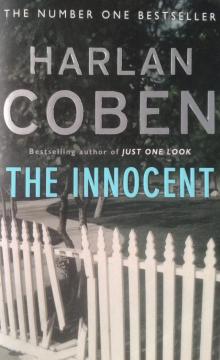 The Innocent
The Innocent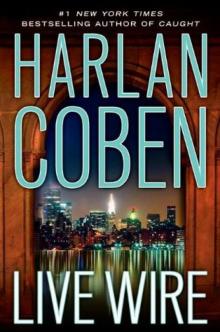 Live Wire
Live Wire Play Dead
Play Dead Drop Shot
Drop Shot Seconds Away
Seconds Away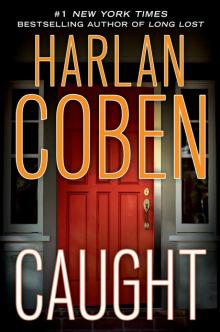 Caught
Caught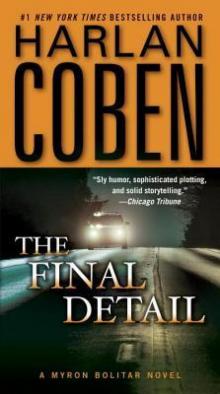 The Final Detail
The Final Detail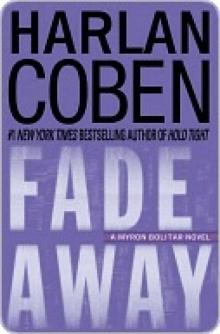 Fade Away
Fade Away Home
Home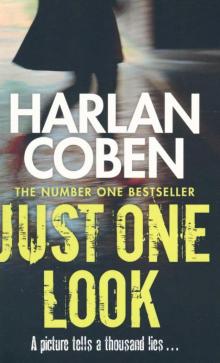 Just One Look
Just One Look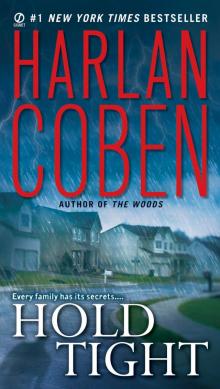 Hold Tight
Hold Tight Fool Me Once
Fool Me Once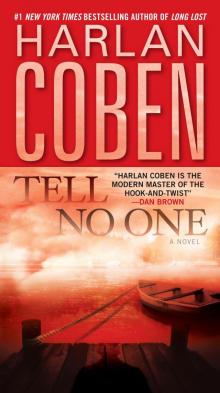 Tell No One
Tell No One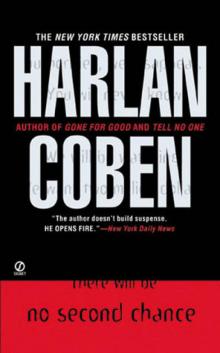 No Second Chance
No Second Chance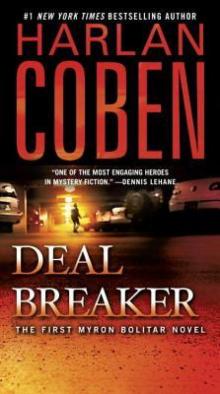 Deal Breaker
Deal Breaker Long Lost
Long Lost One False Move
One False Move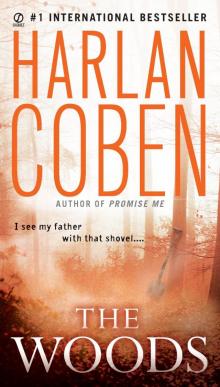 The Woods
The Woods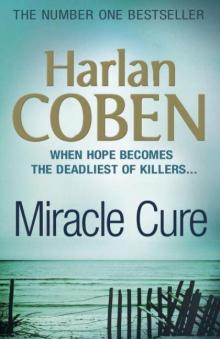 Miracle Cure
Miracle Cure Found
Found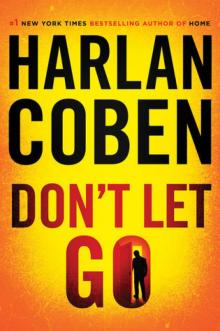 Don't Let Go
Don't Let Go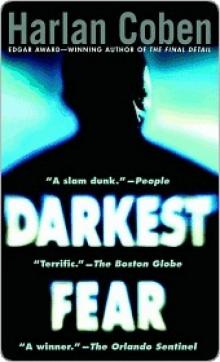 Darkest Fear
Darkest Fear The Stranger
The Stranger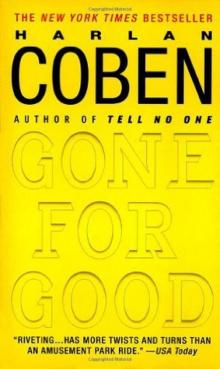 Gone for Good
Gone for Good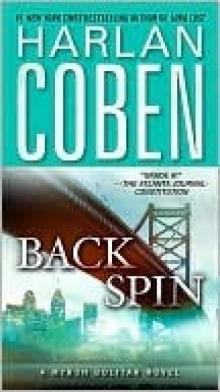 Back Spin
Back Spin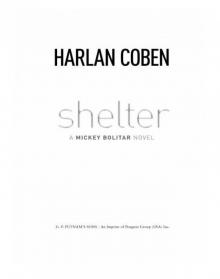 Shelter
Shelter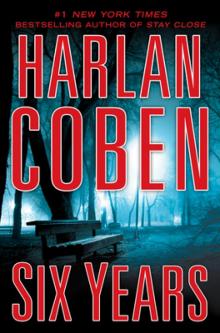 Six Years
Six Years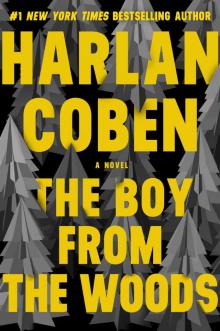 The Boy from the Woods
The Boy from the Woods Missing You
Missing You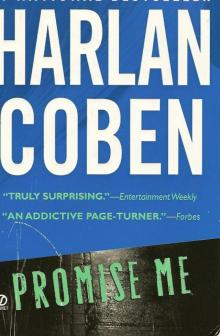 Promise Me mb-8
Promise Me mb-8 The Final Detail: A Myron Bolitar Novel
The Final Detail: A Myron Bolitar Novel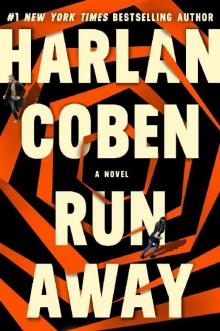 Run Away
Run Away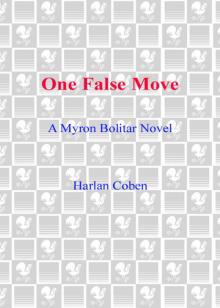 One False Move: A Myron Bolitar Novel
One False Move: A Myron Bolitar Novel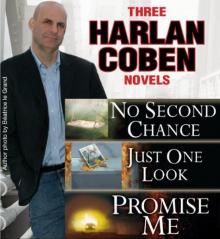 Three Harlan Coben Novels
Three Harlan Coben Novels the Woods (2007)
the Woods (2007) Tell No One (2001)
Tell No One (2001) the Innocent (2005)
the Innocent (2005)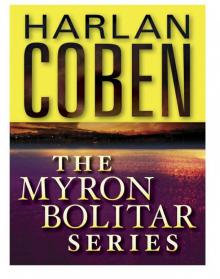 The Myron Bolitar Series 7-Book Bundle
The Myron Bolitar Series 7-Book Bundle Gone for Good (2002)
Gone for Good (2002) Caught (2010)
Caught (2010) Hold Tight (2008)
Hold Tight (2008)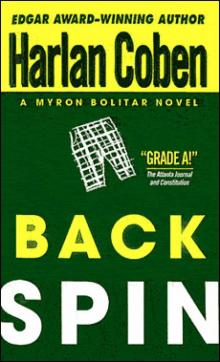 04 - Back Spin
04 - Back Spin Miracle Cure (1991)
Miracle Cure (1991) Harlan Coben 3 Novel Collection
Harlan Coben 3 Novel Collection Just One Look (2004)
Just One Look (2004)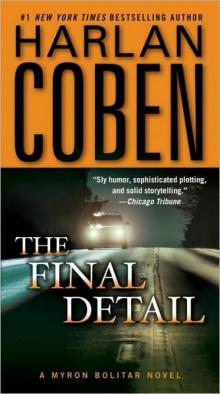 The Final Detail mb-6
The Final Detail mb-6 Play Dead (2010)
Play Dead (2010)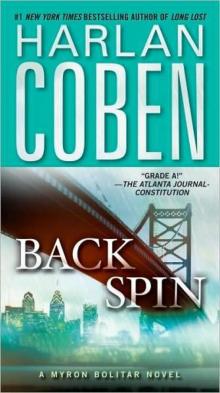 Back Spin mb-4
Back Spin mb-4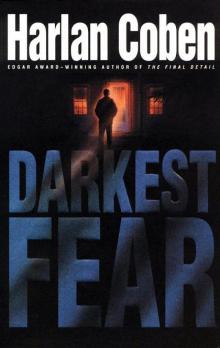 Darkest Fear mb-7
Darkest Fear mb-7